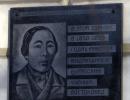The main character of Turgenev's story is Mumu. I.S. Turgenev "Mumu": description, characters, analysis of the work. Brief description of Gerasim's closet from the story "Mumu"
Gerasim is the main character of I. S. Turgenev’s story “Mumu”
Gerasim is the main character of Ivan Sergeevich Turgenev’s story “Mumu”. Literally from the first lines of the work, starting the story about the old lady, the author himself distinguishes him from other characters: “Of all her servants, the most remarkable person was the janitor Gerasim...”.
Describing Gerasim, Turgenev admires his strength and hard work: “Gifted with extraordinary strength,
he worked for four - the matter was going well in his hands...” However, the author endowed his hero with one more difference - Gerasim was mute.
But from the story we understand that in reality all the other heroes were “mute”, who did not have their own opinions and their desires, did not know self-esteem and were like slaves.
In describing the character, actions of Gerasim, his relationships with other characters, Turgenev shows the moral superiority of this hero. Talking about Gerasim, the author compares him to a young and healthy bull, a sedate gander, and a lion. To show the heroic power of Gerasim, Turgenev uses hyperbole: “... the scythe acted so crushingly that it would be enough to sweep away a young birch forest from its roots...”, “... built... a truly heroic bed; a hundred pounds could have been put on it - it wouldn’t have bent...”
If the author compares Gerasim with a hero, a giant, then he calls the rest of the heroes “little people.” The courtyard people tried to please the lady, mindlessly fulfilling her every whim, humiliating themselves and others. The lady considers herself to have the right to control their destinies. So, for example, because of her whim, Gerasim lost first Tatyana, and then Mumu.
Throughout the story, we see that in any situation the hero retains such qualities as hard work, honesty, and the ability to love. He always keeps his word and has self-esteem. This is the moral superiority of Gerasim.
Turgenev says about Gerasim: “he... followed all orders exactly, but he also knew his rights...”. So, having obediently fulfilled the will of the lady by drowning Mumu, Gerasim goes to the village. With this he expressed his protest against the mistress’s attitude towards her servants.
The very last word of the story is “mute.” Turgenev shows us that, unlike heroes who can speak, only the mute Gerasim has a voice - his own voice.
Searched here:
- Gerasim the main character of the story Mumu
- essay about Gerasim
- essay about Gerasim
The main character of Ivan Sergeevich Turgenev’s work “Mumu” was the serf Gerasim. He was of extraordinary strength, hardworking, sympathetic, kind, but, unfortunately, he was deaf and could not hear. His communication with people was very small, as he could only utter some sounds, which no one understood. Gerasim communicated more with nature and the world around him.
Turgenev, creating the image of Gerasim, wanted to put into him the features of a strong and patient Russian people. He wanted to show the Russian serf from the best side, because previously serfs were not considered equal people and were treated like things. They were forcibly married, taken away from home, and everything that was most precious was taken away from them.
In the story "Mumu" Gerasim, a serf peasant who lived in the village. Because of the kindness he showed to the lady, he caught her eye, which became a very big tragedy for him. The lady, seeing such a healthy, hard-working man, decided to reward him with her “mercy.” She ordered him to move to the city, to her estate, and gave him a closet. And I would have forgotten about him if Gerasim had not fallen in love with Tatyana. Tatyana was also a serf and belonged to the lady. Gerasim's love frightened her, because the people who lived with the lady at court did not really love Gerasim. They did not understand and were afraid of him.
The lady decided everything very simply, without thinking about Gerasim or Tatyana. She quickly arranged Tatiana's wedding with one of her servants. And she sent them away because Tatyana’s husband liked to drink. Gerasim was very sad. But another love appeared in his life. One day, while passing by the river, he saved a little puppy. He brought him home, went out, and fed him. He named him Mumu. They became the best of friends. Mumu always ran after him, and in the evening she guarded his closet. But the happiness of Gerasim and Mumu did not last long. The capricious lady ordered to get rid of Mumu, because Mumu barked at night and disturbed her sleep. It is very difficult to describe how Gerasim grieved. He himself volunteered to kill Mumu. He was kind and affectionate with her until the very last minute. He could not disobey the lady’s order and did what he promised. But the strength of his soul and self-esteem were very great. Having done everything he was told, he never returned to the lady. He went back to the village. To your fields and forests. To nature, which was very close to him and which he loved very much. Soon the lady died and the estate forgot about him.
Many readers, having read this work, see in it a simple sad story about great love between Gerasim and Mumu. In fact, Turgenev, when he wrote this work, wanted to tell people how great and powerful, how patient and meek the Russian man is. And he also wanted to show what a big and deep soul the Russian person has. How can he love and be devoted and how can he, being in such terrible conditions, remain a real person with great pride and respect for his feelings.
Lady in the story “Mumu” - the landowner, the culprit of all the troubles and suffering of the protagonist. He interferes in Gerasim’s life three times, ruining it according to his absurd whim. The behavior of the lady is portrayed as a typical example of serfdom, which was noticed by officials of the censorship department, who suspected Turgenev of trying to restore readers against “the attitude of serfs to their owners that exists in our fatherland” (i.e., against serfdom). The heroine’s behavior is motivated by her psychological characteristics: Turgenev takes into account old age, loneliness, melancholy and boredom of a creature that no one needs. But, explaining the capriciousness and irritability of the lady with all this, Turgenev does not justify her - the consequences of her actions are so terrible that the reader is completely deprived of the emotional opportunity to come to terms with them.
Gerasim- the main character of the story “Mumu” by Turgenev. His initial characterization is based on associations that bring Gerasim closer to the epic heroes: he, like them, is unusually strong and is also connected with the land that he cultivates and loves. The impression is complicated by the fact that the hero is deaf and mute from birth. This is perceived as a misfortune that dooms him to complete loneliness. But another semantic connotation immediately appears: the hero’s deafness and muteness impart to his behavior a kind of unfussiness and even greatness (“Constant silence gave solemn importance to his tireless work”).
At the whim of the lady, Gerasim is torn away from peasant work and thrown into the city world, where his existence is meaningless and absurd. But the hero’s patience overcomes this disaster: Gerasim got used to his new fate and even reconciled with it, because he fell in love. He loves the meekest and most unrequited of the courtyard girls, finding the meaning of life in protecting and surrounding with care a human being, like him, deprived of happiness. And again a lordly whim ruins his life: a bored landowner, on an absurd whim, passes off Tatyana as a drunkard servant. Gerasim painfully experiences the loss, but then again finds solace in love for a weak and helpless creature. He becomes attached to the dog he rescued, and this attachment gives his existence meaning. But here, for the third time, the master’s arbitrariness intervenes in his life: the lady orders him to get rid of the dog.
In desperation, Gerasim decides to drown his pet himself and then carries out his decision. However, this time the hero’s grief is so great that his usual humility comes to an end. A rebellion occurs, but an unusual revolt, alien to any kind of aggression. The hero simply ceases to recognize the power of the lady and returns to his village world, from which he was forcibly expelled. Before the force of this silent protest, the lady retreats, not daring to demand Gerasim back. The story “Mumu” was written at the height of the government reaction, but the ending of Gerasim’s story is permeated with a premonition of the liberation of the Russian peasantry from serfdom.
Tatiana- a yard girl whom Gerasim loves. An unhappy, downtrodden and frightened creature. Her whole life passes in labor, hardship and suffering. Gerasim turns out to be the first person who becomes mentally attached to her and protects her from bullying. Forced marriage and exile with her drunkard husband to a distant village completely ruin her life. And only at this moment is some not entirely clear feeling revealed that connected her with the hero of the story (“Tatyana, who had endured all the vicissitudes of her life with great indifference until that moment, here, however, could not stand it, shed tears and, getting into the cart, -Christianly kissed Gerasim three times").
The tragedy and hopelessness of the main character I.S. Turgenev is revealed already in the first lines of the well-known story “Mumu”. The whole idea of the story is that a simple man, mute from birth, turned out to be more eloquent, being disproportionately strong and having a threatening appearance, he was able to show spiritual beauty against the backdrop of cowardice and injustice.
Gerasim, whom the reader recognizes at the beginning of the story, is endowed with an extraordinary appearance, he is huge - “... twelve inches tall...”, extremely strong, which is emphasized. This is a prominent and powerful person, but he is prejudicedly deprived of nature, since he does not have the ability to hear and speak. However, he possesses one of the main human qualities - generosity.
Within the city yard, where an old lady hires him to work as a janitor, Gerasim yearns for his native dilapidated house, for his usual village work in the field, but does not show his emotions and spiritual experiences. Due to his heroic appearance, the main character quickly gains the authority of a bouncer among the courtyard servants. What servants are there - even the roosters are afraid of him, who do not dare fight in front of him. The janitor sweeps away his sorrows with his labors, as the author notes - he worked for four. He performed his duties regularly in a short time, the yard was always perfectly clean, and the house was reliably guarded. The new work seemed like a joke to him, compared to the hard peasant work.
Describing the greatness and simplicity of his hero, Turgenev emphasizes: “Constant silence gave solemn importance to his tireless work.” There was sternness and seriousness in his face. Sloppiness was not noticed in him; on the contrary, his priority was order in everything. The author seems to inconspicuously hint at his taste - he arranges the closet allocated to his personal possessions according to his own comfort, installs there a heroic bed, the same table and stool. He does not let anyone into his “corner”, keeping the door locked, always having the key with him, on his belt. He was also neat in his clothes, but despite all this, the butler called him a goblin, and the rest of the serfs were afraid of his menacing and gloomy appearance, while some rightly “received” from his wide palm.

(Nina Grebeshkova and Afanasy Kochetkov, film "Mumu", 1959)
The essence of Gerasim, behind his external mask, tough and unshakable, hid a sensitive soul from the crafty and cowardly inhabitants of the house. Chelyadintsev was surprised by his sympathy for a certain Tatyana - a modest and timid, inconspicuous washerwoman. For these “little people” it was unnatural that a hefty brute could have the most tender feelings for both a woman and a small animal. The climax of his entire short service with the capricious old lady was the death of the dog, to which he selflessly became attached and which, under the yoke of the dull butler, he had to destroy with his own hands. First, the betrayal of people he trusted. Those who could not break his natural strength suffered mental exhaustion. Gerasim returned to his native village, fortunately for haymaking.






